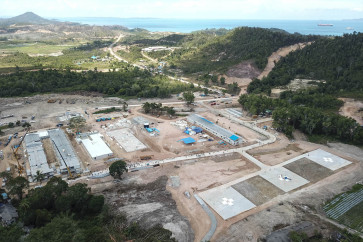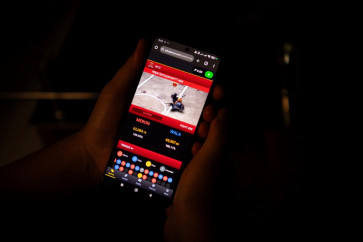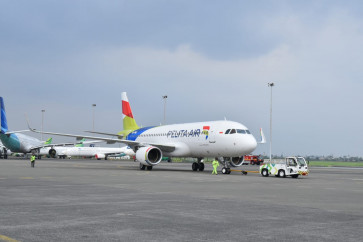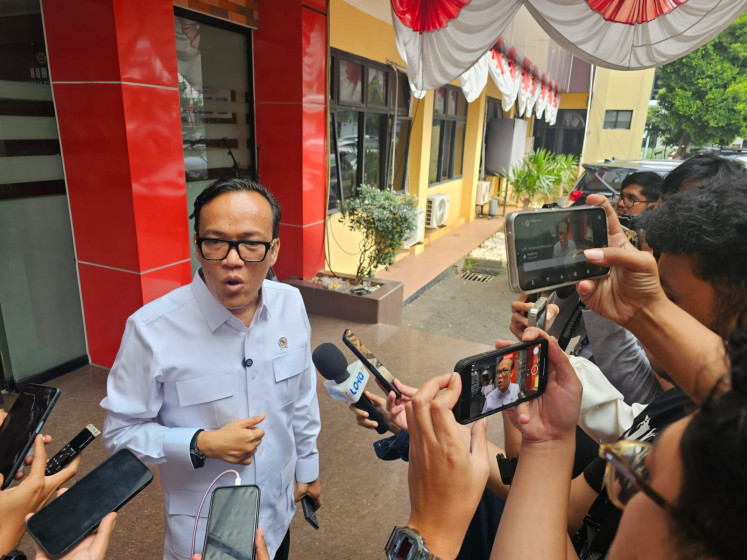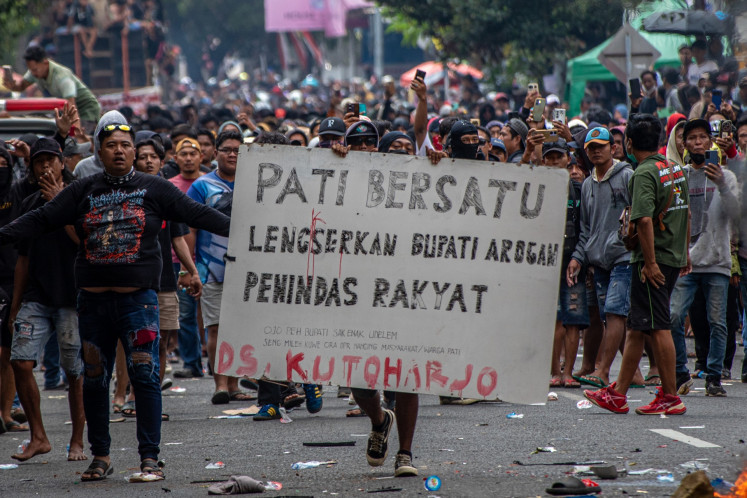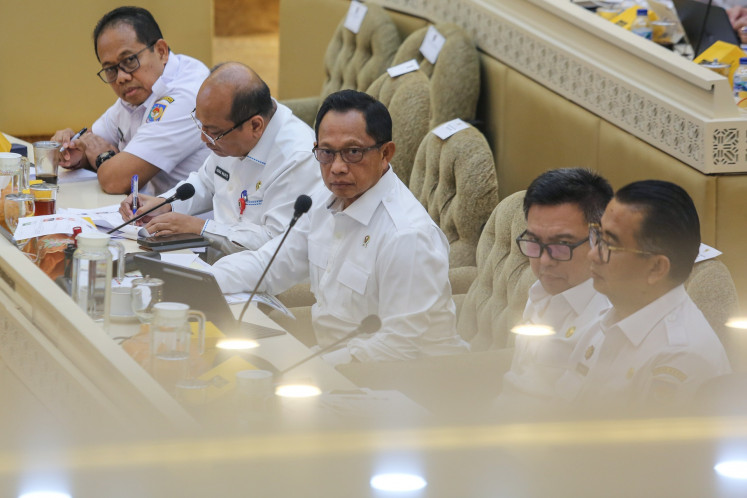Popular Reads
Top Results
Can't find what you're looking for?
View all search resultsPopular Reads
Top Results
Can't find what you're looking for?
View all search resultsIndonesia’s much-needed organ bank on the way
Human organ transportIndonesia is yet to have an organ bank, a facility needed not only by patients but also by donors
Change text size
Gift Premium Articles
to Anyone
Human organ transport
Indonesia is yet to have an organ bank, a facility needed not only by patients but also by donors.
Japanese Masaru Kawada never imagined that his life would end in a small prison in Indonesia. However, he has made a last wish before he dies.
“I want to donate all my organs to Indonesian and Japanese people. Kidney, lung, heart, liver, corneas, bone marrow and others,” the 75-year-old said at a prison in Pariaman, West Sumatra.
On May 20, 2015, the Pariaman District Court sentenced Kawada to life imprisonment for smuggling 2.7 kilograms of crystal meth through Minangkabau International Airport on Nov. 22, 2014.
After hearing the judge’s decision, he planned to commit suicide. However, he changed his mind because suicide is against his religion, Christianity. His wife, who donated her kidney to their son five years ago in Japan, inspired him to become a deceased donor. His family gave him the go-ahead and his prison warden has promised to convey his wish to the central government.
Kawada, who is the only foreigner in the prison, is still waiting for official approval from the government. He also plans to send a letter to President Joko “Jokowi” Widodo to convey his wish.
Jakarta-based Siloam Hospital internist and nephrologist Tunggul D. Situmorang said organ transplantations, either from a living donor or deceased donor, could save the life of patients in need.
“Giving life to another person is an act of charity,” he said.
However, in Indonesia, it is rare to find people who wish to become deceased donors, he said. Tunggul is not aware of any local case of a kidney failure patient receiving an organ from a deceased donor. If the patients got kidney transplants, they came from living donors who were their relatives, not from strangers, he added.
Meanwhile, in Singapore, the government provides a way for people to become living donors or deceased donors for transplants, research or education through the Organ Donor Registry managed by the Health Organ Transplant Unit.
The Malaysian government also has the National Transplant Registry after it established the National Transplant Rescue Center in 1997 to accommodate people who wish to become deceased donors. Meanwhile, the United States’ transplantation and organ system is managed by non-profit organization United Network for Organ Sharing (UNOS).
The absence of an organ bank in Indonesia has posed difficulty for donors like Kawada who wish to sign up as a deceased or living donor to help patients.
“Indonesia does not have [an organ bank],” Tunggul said. “If there is someone who wants to donate his kidney voluntarily, where should he or she go? There is no [such place].”
It is difficult to find a donor in the country that, according to Tunggul’s data, is home to around 120,000 kidney failure patients.
Meanwhile, the number of kidney transplants decreased from 87 in 2014 to 33 in 2015. Tunggul said the first kidney transplants in the country was carried out in 1977. From that time until 2015, only 774 kidney transplants were carried out.
“That figure does not make sense! In a country with a population of more than 250 million people, the number of transplants has yet to reach 1,000 since 1977,” he said.
The figure is half of that of Singapore, which has seen over 1,500 kidney transplantations since 1972, comprising 1,000 from deceased donors and 500 from living donors. In Malaysia, the number of people who have pledged to be organ donors reached 35,377 in 2015.
The World Health Organization (WHO) reported that the total number of organ transplants performed worldwide increased by 14 percent from 104,314 in 2010 to 119,678 in 2014. Kidney transplants accounted for 79,768, according to the latest figure.
Kidney patients who have yet to find a donor must undergo dialysis or a regular blood-cleansing process to stay alive. Tunggul says that compared to dialysis, transplantation is a better treatment because the kidney will work 90 percent more effectively.
Cultural observer Radhar Panca Dahana, for example, undergoes dialysis that costs him around Rp 1 million (US$75) three times every week at the Cipto Mangunkusumo Hospital (RSCM) in Central Jakarta while waiting for a transplant.
He has suffered from end-stage kidney failure for 15 years after he was diagnosed with it at the age of 35. He revealed that that in the past, strangers often came to him to sell kidneys. However, he rejected their offers because he understood that organ trading was against the law.
The Indonesian government allows human organ transplantation but it bans organ trading, according to regulation in lieu of law (perpu) No. 18/1981 on Clinical and Anatomic Autopsy and Human Organ and Tissue Transplantation.
To stop the unregulated and illegal practice of organ trade as well as to accommodate people who want to become donors, the National Committee on Transplantation is now being established after Health Minister Nila Moeloek issued regulation (permenkes) No. 38/2016 on Organ Transplantation on Aug. 3.
The forming of the committee was triggered by the arrest of three suspects on Jan. 17 in Bandung, West Java, for allegedly recruiting poor people to become organ donors and then trading their kidneys. They set a price of around Rp 250 million for one kidney and would give the donor around Rp 70 million.
Lawmaker Dede Yusuf, the head of House Commission IX overseeing health and manpower affairs, said his commission had asked the health minister to issue another ministerial regulation about the establishment of an organ bank.
Asked about the regulation for the organ bank, ministry spokesperson Oscar Primadi said, “We are still creating it.”
While waiting for the realization of the organ bank, truck driver Sutriyono has become a member of community Pejuang Hati (Liver Warrior) where he shares his story to encourage others to become donors.
Last year, Sutriyono donated 30 percent of his liver to his son, Battar Abinaya Basupati, who suffered from biliary atresia, a liver disease in which one or more bile ducts are narrow, blocked or absent after birth. The surgery cost around Rp 600 million. After the surgery, his recovery was quick and he soon returned to work.
Sutriyono says that after the surgery, he can now watch his 2-year-old son laughing and cheerfully playing with his friends.
“In Battar’s liver, there is my liver,” the 36-year-old says, smiling.
— Photo by A. Kurniawan Ulung


